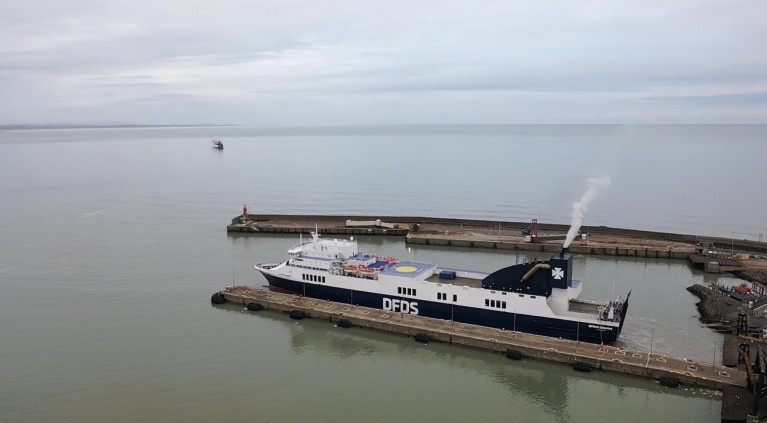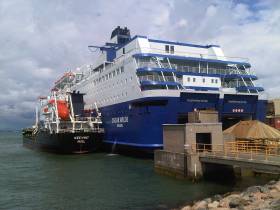Displaying items by tag: RosslareFrance
The ferryport of Rosslare Europort is to mark another historic maritime milestone this afternoon as a new 'freight' ro-ro route linking Ireland and continental mainland Europe operated by DFDS is to start thus bypassing a post-Brexit UK, writes Jehan Ashmore.
At 1400hrs, the DFDS owned ropax Optima Seaways is to depart loaded with its first cargo of freight trucks and drivers (with individual Covid19 safe cabins) on the near 24-hour route beyond the English Channel to the French port of Dunkirk (Dunkerque) on the North Sea.
Optima Seaways (see recent report) built by Visentini in 1999 and with a capacity for up to 120 trucks and trailer plus drivers, is scheduled to arrive at the mainland Europe port tomorrow, Sunday at 1400hrs, that been Central European Time (CET).
For Irish industry the direct sea route offers a vital alternative to the UK landbridge and customs checks, as Dunkirk represents a key strategic location for hauliers as the French port is a mere 10kms from the Belgium border. In addition neighbouring Netherlands, Luxembourg and Germany. Also truckers can use the motorway network to easily access Paris and to Switzerland and beyond into central Europe.
Operating the DFDS route based on a 6 days a week sailing schedule will involve a further pair of chartered ferries to maintain freight demand. These vessels are Destination Gotland's fast-ropax Visby and Stena Ro Ro's Kerry which is currently at anchor off the Wexford port. The 2001 built Kerry (of same Visentini series), is also to berth in Rosslare Europort today to load for the second outward bound sailing to Belgium set for 2300hrs tonight. The crossing time to the port is to be completed on Sunday night at 2300.
As for the first inbound sailing of Dunkirk-Rosslare-Europort, this will see the deployment of the chartered ropax Visby which Afloat has also tracked based in the Belgium port for several days having made a repositioning voyage from the Baltic Sea.
It should be noted that the most notable difference between the trio of ferries is that the 'Visentini' ropax pair have the Italian shipyard's standard 'stern-loading' only access, whereas the larger Chinese built Visby of 2003 has full drive-through stern and bow door operations.
#ferry - Minister for Transport has been accused of not doing enough to get a replacement for the Irish Ferries service linking Rosslare with Cherbourg.
The company according to the Irish Examiner, announced just before Christmas that it was unlikely to operate the route in 2019.
Verona Murphy from the Irish Road Hauliers Association says the response so far from Minister Shane Ross has been poor.
"Shane Ross should be actively looking for somebody to come into Rosslare and usurp the route that will provide what's needed for the exports of Ireland, to keep that foreign-direct investment that we've garnered and keep Irish people in jobs so that the economy will not suffer worse," she said.
"That route is primary. It's our shortest distance to mainland Europe."
Afloat adds the newspaper's photo is of the Normandy, which was replaced by Oscar Wilde in 2007.
Wexford Councillor Claims 'A lot of Smoke & Mirrors' Around Irish Ferries' Decision to Halt Services
#ferry - In Wexford, an independent local councillor claims that there is “a lot of smoke and mirrors” around the decision by Irish Ferries to halt its service from Rosslare.
As Breaking News reports, Cllr Ger Carthy says that the decision is “ill-advised” and he asked where was the market research to back up the company’s claim that customers would prefer to sail from Dublin Port.
He told RTE’s Morning Ireland that bookings from Rosslare were full, he also rejected the suggestion that the higher rates being charged by Rosslare port in comparison to Dublin Port had been a factor in the decision.
“The rates were not mentioned in any of the press releases. I don’t believe that’s the case.”
In mid-December Irish Ferries announced that it was “unlikely” to continue to operate a service between Rosslare and France in 2019.
A company statement said: “We continue to keep this situation under review. Our new WB Yeats ship will operate from Dublin to Cherbourg.”
More on the story here.

























































